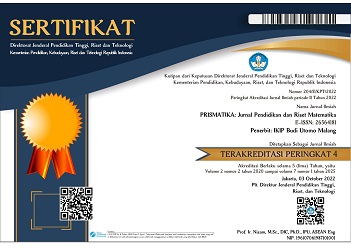RANCANGAN PROJECT BASED E-LEARNING BERBASIS INTERNET OF THINGS UNTUK MENINGKATKAN KEMAMPUAN BERPIKIR KREATIF MAHASISWA
Abstract
This research aims to improve the creative thinking abilities of Tribhuwana Tunggadewi University students through the use of an Internet of Things (IoT) based e-learning project design. The research subjects consisted of 60 students divided into experimental class (30 students) and control class (30 students). The research method used was a control class and an experimental class with pretest and posttest administration in both classes. The data collected is quantitative and qualitative data which is analyzed using descriptive and inferential statistical techniques. The research results showed that there was a significant difference between the creative thinking abilities of students in the experimental and control classes after being given treatment. The experimental class that used an IoT-based project-based e-learning design showed a more significant increase in creative thinking abilities compared to the control class. This shows that the use of IoT-based project based e-learning designs is effective in improving students' creative thinking abilities. Discussion of research results shows that the use of IoT-based project based e-learning designs can improve students' creative thinking abilities through more interactive, collaborative, and contextual learning. In addition, the use of IoT technology can facilitate student-centered learning activities and provide a more personalized and enjoyable learning experience. In conclusion, the use of an IoT-based project based e-learning design can be an innovative and effective alternative learning method in improving students' creative thinking abilities. This research contributes to the development of learning model that is oriented towards creative thinking skills and the use of technology in education.
References
Al-Fuqaha, A., Guizani, M., Mohammadi, M., Aledhari, M., & Ayyash, M. (2015). Internet of things: A survey on Enabling Technologies, Protocols, and Applications. IEEE Communications Surveys & Tutorials, 17(4), 2347-2376.
Atzori, L., Iera, A., & Morabito, G. (2010). The Internet of Things: A Survey. Computer Networks, 54(15), 2787-2805.
Dayu, Dian Permatasari Kusuma. 2019. Model Project based learning untuk Meningkatkan Kemampuan Berfikir Kreatif Bahasa Indonesia. Prosiding Seminar Nasional Hasil Penelitian LPPM Universitas Negeri Madiun.
Febriyanti, Arida, Agus Susanta, dan Abdul Muktadir. (2021). Pengaruh Model Pembelajaran Project based learning (Pjbl) terhadap Kemampuan Berpikir Kreatif dalam Pembelajaran Tematik Muatan Pelajaran IPA Peserta Didik Kelas V SD Negeri. JP3D (Jurnal Pembelajaran dan Pengajaran Pendidikan dasar), 3(2), 176-183.
Muhajir, Hariani. (2022). Keterampilan Berpikir Kreatif Peserta Didik melalui Model Project based learning (PjBL) secara Daring. Didaktika Biologi: Jurnal Penelitian Pendidikan Biologi, 6(1), 21-29.
Nugroho, Gilang Akbar, Baskoro Adi Prayitno, dan Joko Ariyanto. (2017). Peningkatan Kemampuan Berpikir Kreatif Melalui Penerapan Project based learning pada Materi Pencemaran dan Daur Ulang Limbah. Bio-Pedagogi: Jurnal Pembelajaran Biologi, 6(2), 9-12.
Nurudin, A. A., dkk. (2018). Design and Implementation of Internet of Things (IoT) Using Arduino. International Journal of Advanced Computer Science and Applications, 9(10), 273-278.
Kurniawan, A. (2021). The Role of IoT-based E-Learning Infrastructure in Improving Learning Outcomes: A Review. Journal of Physics: Conference Series, 1806(1), 012094. https://doi.org/10.1088/1742-6596/1806/1/012094.
Ningsih, T. R., & Astuti, S. D. (2019). Pengaruh E-Learning Berbasis Internet of Things (IoT) Terhadap Kemampuan Berpikir Kreatif Mahasiswa. Prosiding Seminar Nasional Pendidikan Matematika, 210-216.
Setiawan, R., & Mitasari, Z .(2020). Penerapan Scaffolding Sebagai Upaya Dalam Meningkatkan Level Berpikir Matematis Siswa Ditinjau Dari Taksonomi Solo. MUST: Journal of Mathematics, Education, Science and Technology, 5(1), 68-79. http://doi.org/10.30651/must.v5i1.4855
Siahaan, P. (2019). E-learning sebagai Alternatif Pembelajaran dalam Meningkatkan Kualitas Sumber Daya Manusia. Jurnal Profesi Pendidikan, 2(1), 51-56.
Suryani, A. M., Kusumawardhani, N. A., & Hidayat, A. (2020). E-Learning Berbasis Internet of Things untuk Meningkatkan Kemampuan Berpikir Kreatif pada Mata Kuliah Arsitektur Jaringan. Jurnal Penelitian Pendidikan Teknologi Informasi, 7(2), 105-114.
Wijaya, E., & Setiawan, R. (2021). RME-based Absolute Value Worksheet Design as an Effort to Improve Mathematical Thinking Ability of Tribhuwana Tunggadewi University Students. MEJ: Mathematics Education Journals, 5(2).
Yilmaz, R. M. (2021). The Role of E-learning in the COVID-19 Pandemic: An Analysis of the Current Situation and Future Perspectives. Journal of Educational Technology and Online Learning, 4(1), 32-40.







.png)




